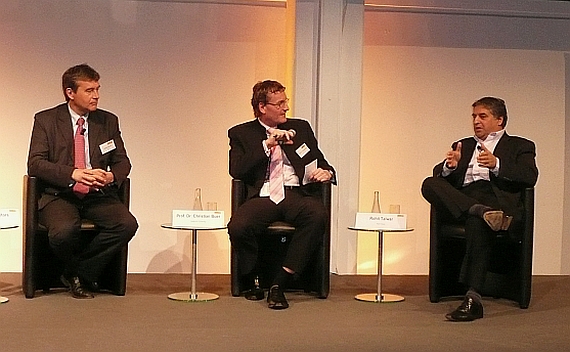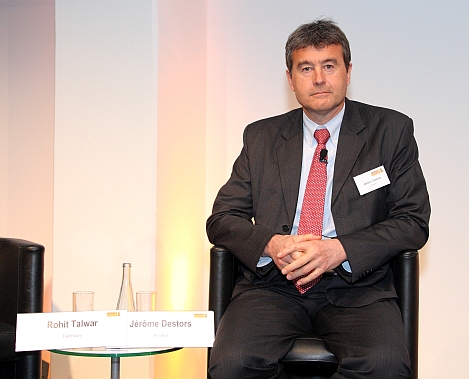Study presented at the ITB Hospitality Day shows future scenarios
 |
|
|
Guest services become more and more sophisticating. Jérôme Destors, moderator Prof. Dr. Christian Buer, and Rohit Talwar (from left) during the 6th ITB Hospitality Day 2011. |
Berlin (April 8, 2011). Hotel categories and brand promises were yesterday; hotels of tomorrow must adjust even more sensitively to the guest types of the future than up to now. Aside from achieving a global overview, regional networks will also gain in importance. To which challenges the hotel must position itself in 2020 arises from a current study that was introduced at the 6th "ITB Hospitality Day" in Berlin and was not absent of practical examples.
The brand variety will continue rise so that an even finer segmentation of the guest layers and an even more individual response to the wishes of individuals will be connected. Rohit Talwar, CEO of the London institute, "Fast Future Research", is firmly convinced of this. He provided the study, "More than segmentation – growth strategies in an era of personalization and global change" for the technology supplier, Amadeus. Extracts from it were introduced by the partners - Rohit Talwar and Jérôme Destors, Director of Hotel IT with Amadeus – at the Berlin ITB.
According to study, the guests of tomorrow are either incredibly busy, only have limited financial means, are searching for simplicity or are rich and difficult to satisfy. The hoteliers who would like to fulfil their needs must think laterally in the future more than ever before and adjust themselves to quicker and quicker changes. Moreover, it is no longer sufficient as was long ago to consider only one future scenario, now several should always be played through.
 |
|
| Rohit Talwar. |
The employees play an important role with the mastering of new situations. Those who place employees today should prefer those who are curious, have no fear of the unexpected and can think in scenarios and are also decisive when all current information points in a direction. The hotel becomes a living laboratory for constant experiments and thus, it sharpens the study.
Soon a Jumeirah Beckham or Hyatt Madonna?
As another trend, the study performs the further advancement of co-brandings. Already today, for example, the Burj Al Arab in Dubai is using bathroom products by Hermès and there are also Versace Hotels. Collaborations with fashion designers could arise but also, for example, co-brandings with stars. Thus, a Jumeirah Beckham or a Hyatt Madonna is absolutely conceivable in the future.
More and more private hotels could use the marketing opportunities of strong partners under their own name in the future as a countermove for the more finely segmenting brand hotels. In support of the "white products" from the industry, the study calls them "white label" hotels.
The hotels of the future are further influenced by global consumer''s trends. There, the rising expectation of the guests in their choices comes with service and hardware. Guests want to filter out only those offers that they need from a pool of services and facility models such as room size, bed type, decoration, pieces of furniture and up to care products or technology.
Hoteliers: Sales models refined, IT is used
To get guests into the property, hoteliers will continually refine their revenue models and their selves in this area with offers like "Pay for what you want" or "Rent the room for 24 hours, regardless of when you arrive". To increase their income, they then should profit from the further knowledge of the study, from the shopping desires of their guests and by selling for example, leather goods, clothing, transportation possibilities insurance or duty-free products on the property.
Also in the future, technology and the internet will have a great influence on the hotel industry. Additionally, not only social networks have a positive influence on tourism. Some young people will no longer feel a great desire for travelling due to their permanent networking. It will be a challenge of the industry to draw them out of the woodwork. One way or another: The intensive employment of social media has become indispensable.
 |
|
| Jérôme Destors. |
The study dedicates a large portion of the study to the area of "Micro-Segmentation" through technology (Amadeus is the commissioner of the study). Since without this tool, the division of the increasingly more fragmented target groups is hardly conceivable. After the already known target groups like Best-Agers or the super-rich High Net Worth Individuals (HNWI), the study also pursues new groups - e.g., the people who will dispose of a genetic passport in the future. This constantly holds health dangers before their eyes after which they should not do this or eat that.
Investors are convinced by market knowledge
Another challenge for hoteliers is the creation of innovative financing. Because hotel operating companies today hardly dispose of their own real estate, they must persuade expansion investors of themselves. Financing ideas also go along with this. According to a result of the study, analysts will judge the value of hotel groups in the future by the ability, depth and quality of their market knowledge.
Regional networks win
The subjects that will also occupy the development of the hotel industry in the future are politics and security, energy production, infrastructure, aviation, travelling in the universe, environmental disasters and climate and health dangers. However, because parts of the world will be unsafe over and over again, the meaning of regional networks also grows. Today, worldwide efforts have been already initiated to hold travellers on their own continents. The study advises the hoteliers who are interested in guests from distant countries to support their visa procurement. Today, the owner of a passport from Great Britain can travel in 166 countries without a visa and those with a Chinese passport, only in 35.
A consolation in the end: Even if the Facebook generation may stick close to home in front of their PC rather to go to a hotel: Business travel will survive in spite of virtual conferences according to the study.
Through the homepage of Amadeus, the more than 50-page study, "Hotel 2020: Beyond segmentation – strategies of growth in an era of pesonalization and worldwide change" can be ordered free of charge by mail; the link to the order form. / Susanne Stauss
Continuative Links:
To print this article you have to be registered and logged in for newsletter, visitor or subscription.





